What began as New York City street theatre and a commentary about overpriced art and the ills of society, 25 years later has become a global phenomenon that has involved five permanent shows and a touring company, 30,000 bald caps and 25,000 cakes of blue makeup, marshmallow throwing, paint drumming, countless references in popular culture, and above all, the men in Blue. Ahead of
their string of Shanghai performances this autumn we spoke to current associate director David Bray about the group's global appeal, a blue man's day and looking at the world through a child's eyes.
How did Blue Man Group get started?
When Chris Wink, Phil Stanton and Matt Goldman came up with the character in the late 1980s, they were doing these happenings in NYC about art, and they needed someone neutral for the audience to connect with. Using the colour blue was creating something the audience could look at but not identify with immediately, or have prejudice against or towards them. Later, they combined this with live music and physical comedy. Audience participation is a massive part of the show, making that human connection by bringing someone on stage, or bringing the Blue Man out into the audience – these things live with you long after the show is over (China, be warned: the Blue Men admonish latecomers in song).
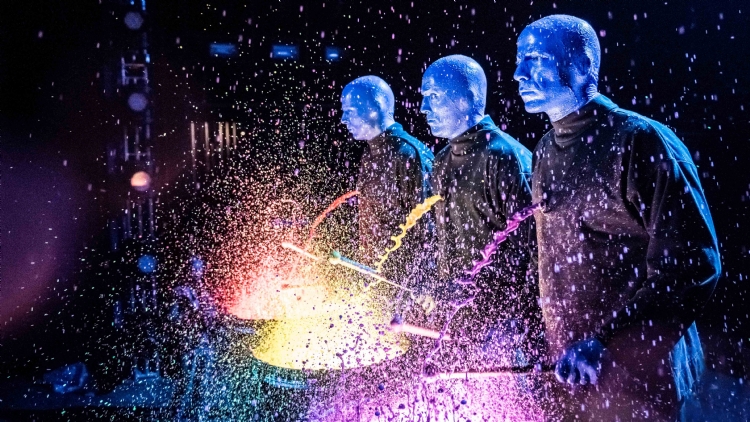
What kind of characteristics are in these training modules?
When we talk about the characters, there are certain elements all of us could identify with – the hero, the shaman, the child and the trickster. We all have elements of those inside us, and the characters combine these elements.
Why is the show important?
At first, there was a strong lean towards holding art up, and asking what is art? Why do we identify with it? And why do we put such a high price tag on it? Eventually, when they found a space in Astor Theatre, 25 years ago now, they pieced a lot of these things together, and combined that with live music and physical theatrical comedy. And the audience participation is a massive part of the show as well, trying to make that human connection by bringing someone on stage, or bringing the Blue Man out into the audience. Those are the essence of the Blue Man Group, these life-affirming elements, the things that live with you long after the show is over.
So this was a comment about the art world that evolved into something else?
We had specific pieces of art that were held up, but yes, the show has morphed over the years. The show we’re doing here is the most up-to-date and technologically advanced one. We focus more now on how technology changes the way we interact with each other, and how that affects human connection. There’s a scene that’s all about walking and texting, as an element, it’s nonverbal, but it turns into a really high octane, visually dynamic piece. It’s about this element of isolation in society; we’re completely engrossed with this thing that is connecting us with someone who is not there. But as the show develops we continue to change as people; we hopefully can keep up with that as well.
When you’re running auditions, what do you look for in a Blue Man?
One thing I look for is humility and the ability to work as a team, because we often talk about the character being three-as-one. There’s tension between those three characters onstage, and people can identify that they all have the same task and goal, but one is pushing and one is pulling. Unfortunately, in this business there is a lot of ego; sometimes it takes people far, and sometimes it gets in the way of them being able to strip themselves down and perform a character. Otherwise, being a Blue Man is liberating, once you become comfortable. It’s tough; it’s not an easy job to get. But once you’re in, it’s a good one.
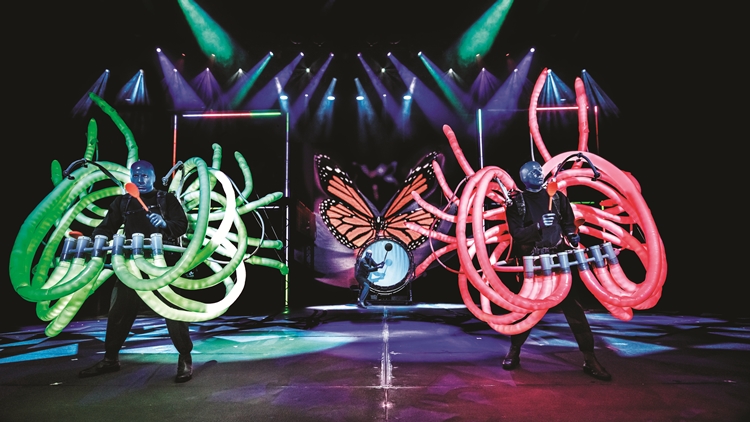
What makes it a good job?
The sense of community. I live in New York and London, but I am lucky enough to be able to travel around the world with many of the touring and international shows. And anywhere I go, I could jump into a show because I know so many of them performing – and it’s not just the Blue Men, the Blue Men are the tip of the iceberg. You also have four to seven band members, a crew of 15 to 20 people, a management and marketing team, and people that clean up the mess after the huge dance party at the end of the show. The passion that every one of those people has towards this project is really moving to see, and to see how much fun they have doing it is even more important.
I hear that being a Blue Man has benefits, even for families? Health insurance? A 401K?
We take such a long time to select and train the performers who come into the company, they get taken care of. We invest a lot of time, energy, and I’m sure money into training performers to reach the right standard of performing, and to be able to portray the character each night as if it’s brand new. Broadway plays circulate the casts a lot quicker; you don’t have people performing the same character night after night, sometimes in the same theatre, for 20 years. That’s mind-boggling. People ask if you get bored, but you don't, because every audience member is different, and they are such a huge part of the show – you can’t dial it in.
How long is training? And are they musicians who learn acting, or actors who learn music, or both?
I think it’s about equal. More and more, we’re getting guys who have some music background, at least in rhythm. Initial training lasts six weeks, after a week of auditions, and then you go into one of the shows and for six to 12 months you do one of the roles. It can take years to get all three roles down. But once you get in, it’s a nurturing process. As for the auditions, within each person, there has to be something, a spark, something about the way they have a smile behind their eyes, or a strong sense of hero about them. We all have different traits that lean towards the character, and we try draw that out of the person auditioning.
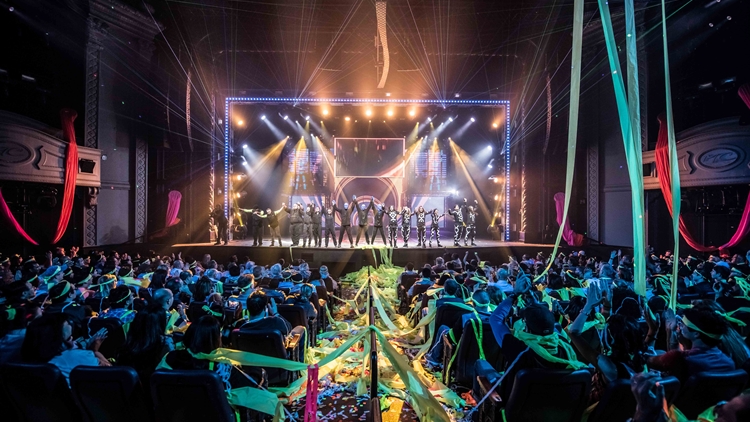
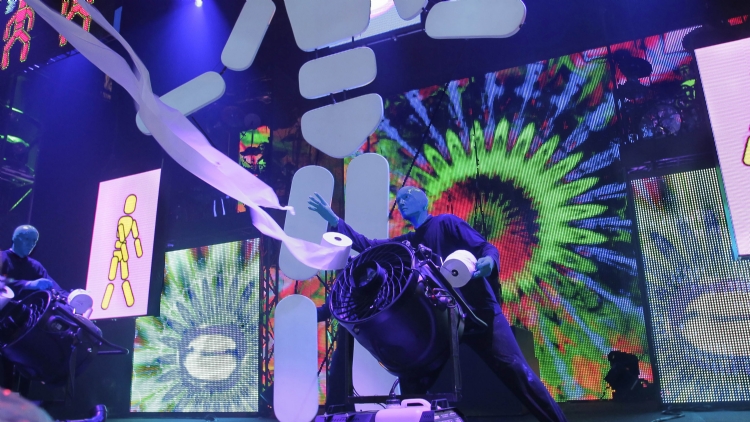
How are the characteristics used in the show?
The four modules are just what we use for training, [we tap into] your hero aspect, your aspect of child – but the child is a really important one, because the Blue Man Group encourages the audience to look at the world through the eyes of a child. We want people to see the potential in something mundane, and to have moments of pure, unadulterated joy. While it’s always good to hear children laughing, I think the adults actually benefit more, sharing a moment with people you don’t know, and letting go of daily stress.
Are the three characters transferable?
Each actor brings his own specific spark to the show each night, and most of the Blue Men perform all three roles, centre, left and right. On any given night, the show is very different, and you have different performers in different roles; there’s a vibe, a feel, and an energy – and there’s humour. A lot of it is improvisational, but even what has been written will change according to how people play it. Three as one – they characters are all exactly the same, but you’ll see elements of emotional tension; one goes off on a rant, and the others have to reign him in. The character has boundless energy, and everyone is up and dancing at the end.
What’s the most challenging thing about being a Blue Man?
The most challenging thing is to let everything go at the door, to rid yourself of that ego, to stay open to what is going to happen that night. As a director, we are constantly writing new ways for the characters to interact with each other, trying to regenerate everything and trying to keep it as fresh and new as possible. Actually, for me personally, I love playing live music; I wasn’t trained in music, but I came into the company and I do consider myself a musician of sorts. I can play a very specific set of instruments very well; I can compose on them, and I can learn new pieces of music on them very fast. That’s a spine-tingling thing for me, performing with these incredible musicians, and creating this kind of sound; that’s very satisfying.
What part does the audience enjoy the most?
They can’t put their finger on it, but there’s something that has changed about them. They’ve opened their eyes or they’ve let themselves go – they’ve seen something that they wouldn’t necessarily have seen before. That night or the next day, there’s something that creeps back in; it’s a long-lasting effect. They can’t explain the show, there isn’t a story or theme, but there’s a magical element that you can’t quite grasp. There’s a renewed sense of joy and wonder.
How about the post-show audience meet and greet?
That came from the performers spending 90 minutes trying to connect with the audience and having this euphoric feeling – there’s paper everywhere and there are big balls, and suddenly the show ends. And it didn’t feel finished. So we wanted to keep that connection going with the audience – and if someone wants to pose for a picture, that’s great. It came out of necessity rather than a marketing ploy; it was more an organic thing.
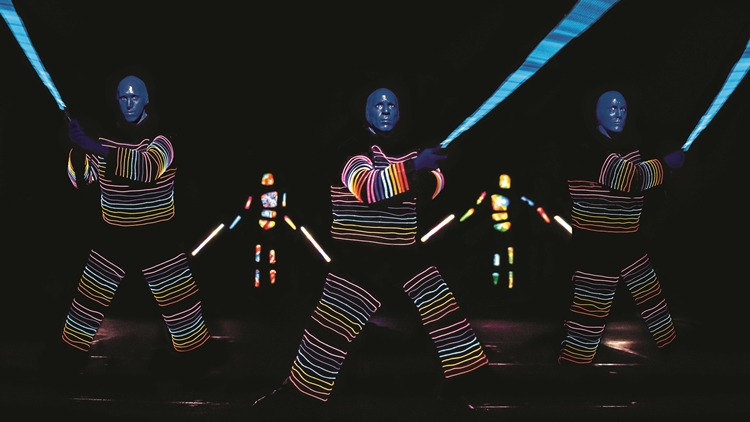
What is an average day for a Blue Man like?
Every day we meet a few hours before the show, and we rehearse some parts, do sound checks, and pick up notes from the night before, because there’s so much to learn from every show. And it takes about an hour for everyone to gather and put on makeup and costumes. I used to have those dreams that we’re on stage, and there’s a moment where we are wearing welding masks, drumming, and the whole house is dark, the only light is coming from the drum, and then we lift our masks, and I look over and realise that I’m the only one without makeup on. It’s a horrendous anxiety dream – I’m naked up there! But the makeup is really something you start to relish; it’s liberating. The moment you put it on, it helps your transformation for the character.
How does the Blue Man Group feel about all the popular culture references, such as in Arrested Development?
Privileged. It’s fantastic to be mentioned in things like that; it just goes to show that it’s is still relevant. We’re always popping up on The Simpsons and Family Guy, and that’s great. It shows that the effort to keep the show developing and up to date with pop culture is working.
How about audience participation?
It is voluntary, just to be clear. Their participation is as passive as audiences want it to be; the Blue Men react off the energy of the audience. And there’s no more 'No Photography' rules – you can’t beat it, so you have to embrace it.
Blue Man Group is at
Shanghai Culture Square from Wednesday November 16-December 4 at various times. Tickets are 288-588RMB. Buy tickets through Time Out Tickets below.
